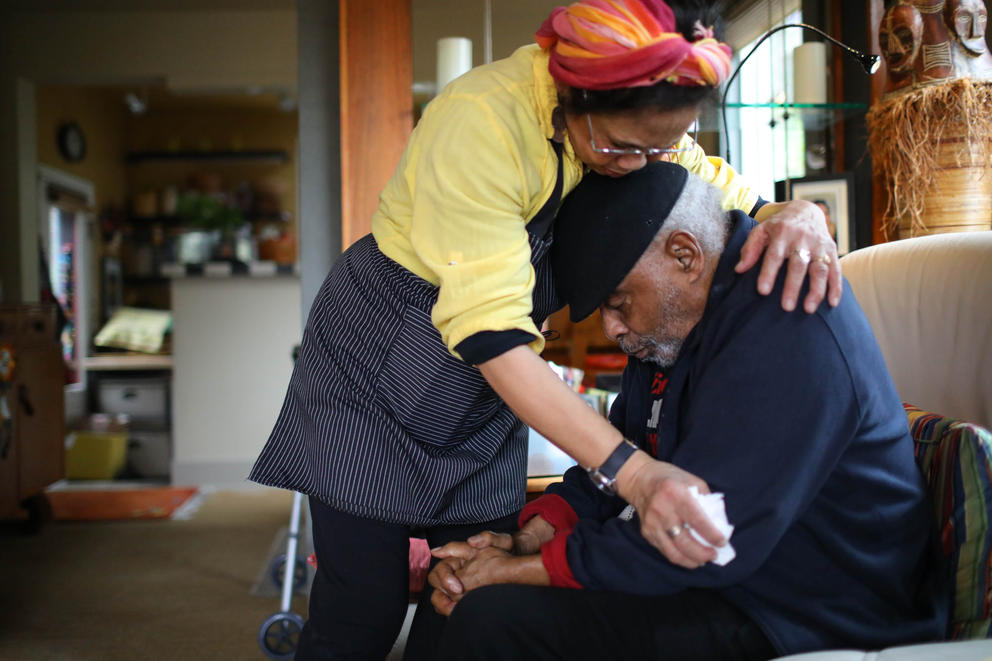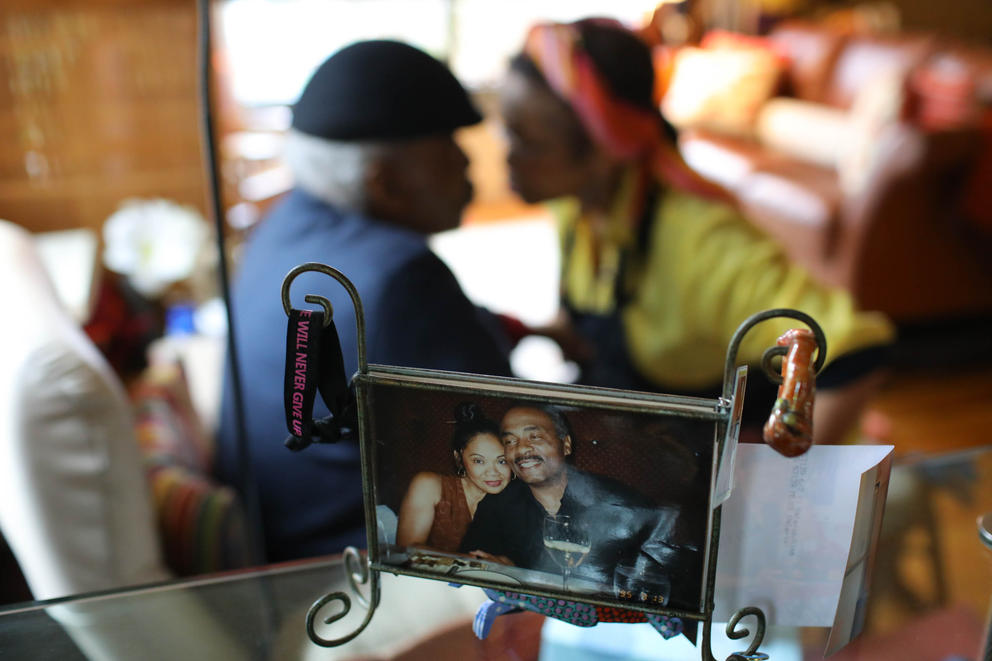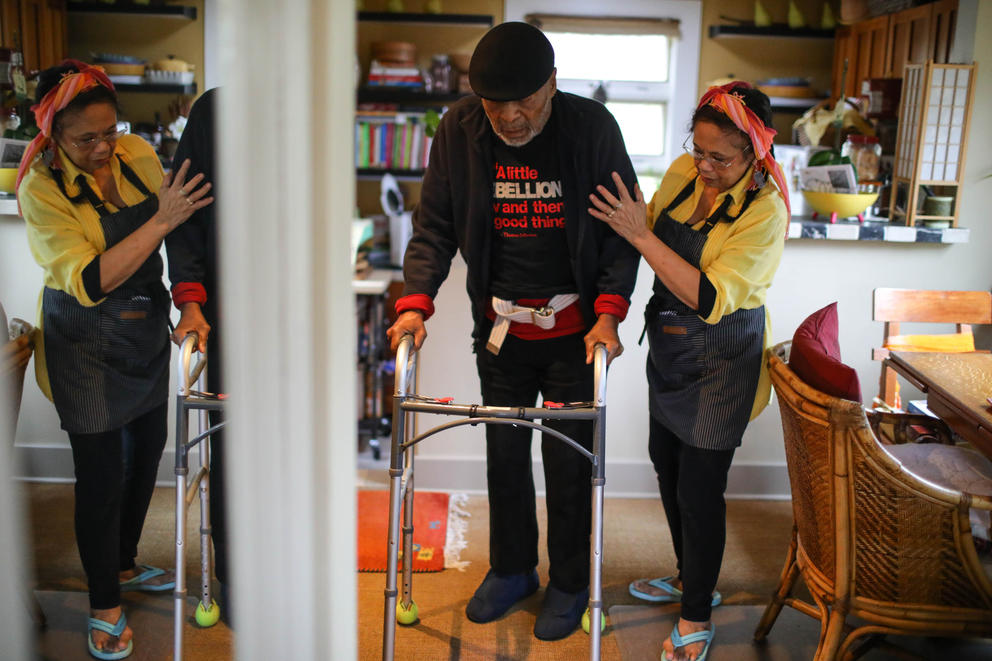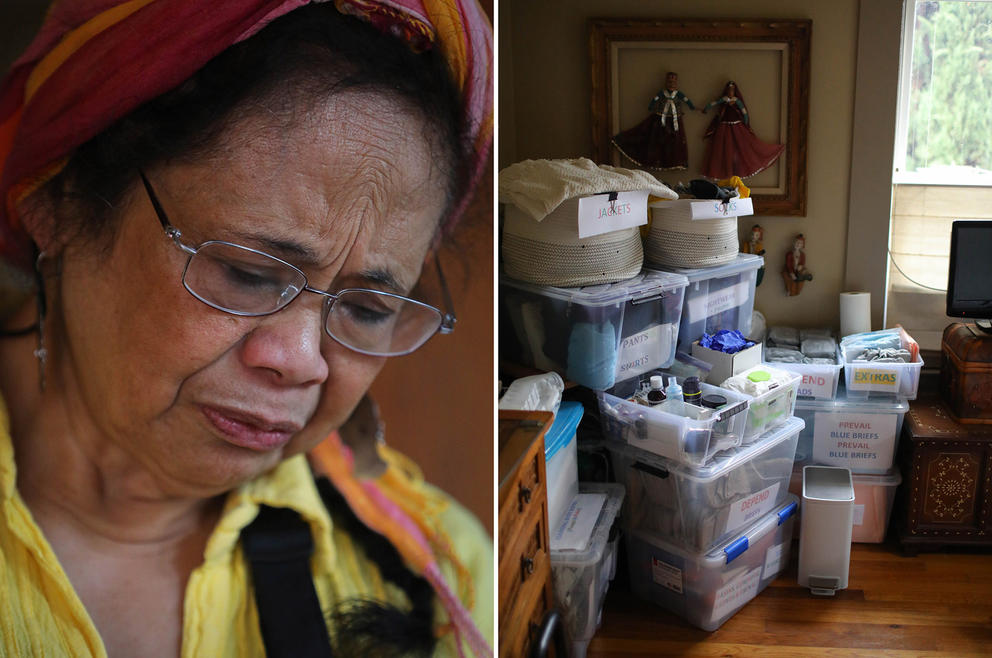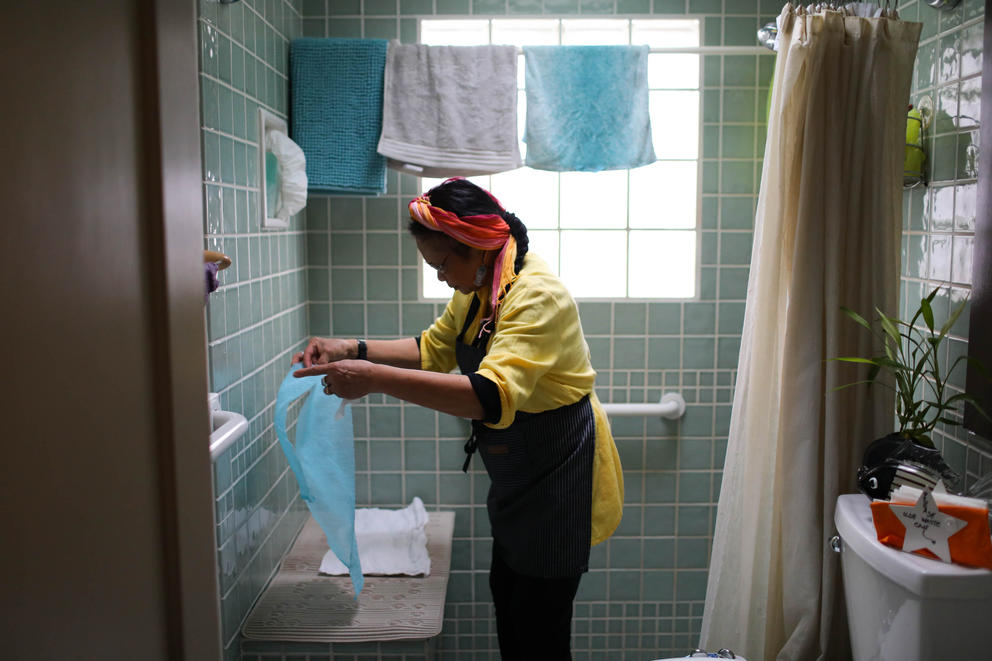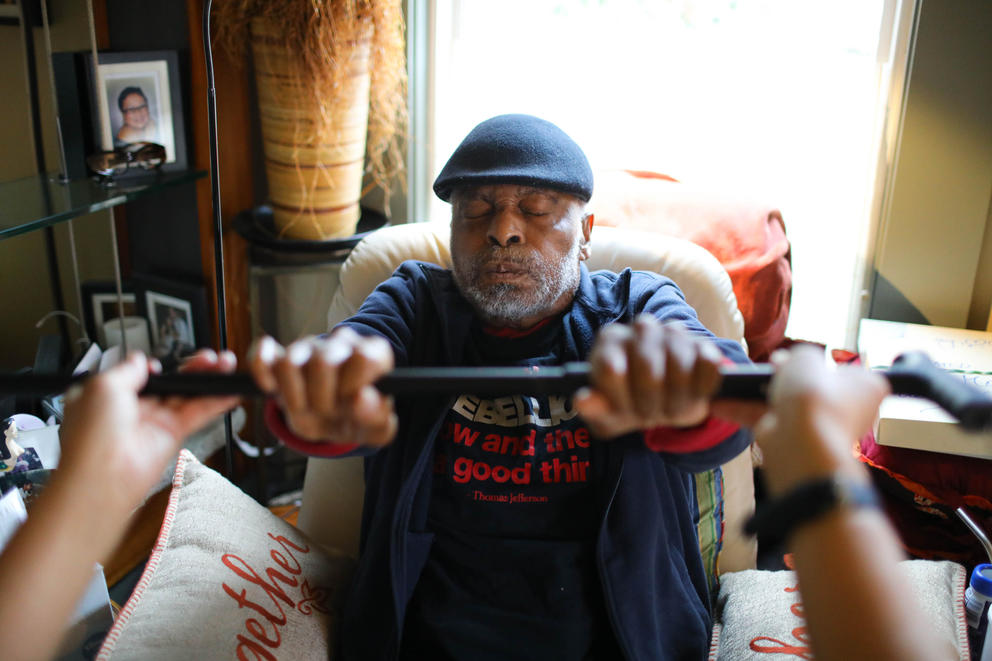Nina, 77, said she now spends all of her time taking care of Joe, who suffers from two types of cancer, partial blindness and memory loss. Recently, she hurt her back trying to lift him.
Joe has been told he only has a few months left to live. And, although Nina is desperately trying to ensure that’s not the case, one thing is certain: This isn’t how she hoped they would spend their final months together.
“I would envision us just holding hands together, and looking at each other and memorizing each other’s faces,” Nina told Crosscut this week. “Creating more memories … instead of me buried in paperwork, buried in phone calls."
A photo of a younger Nina Valerio, 77, and Joseph Scott, 86, sits on a shelf as Valerio helps Scott with physical therapy exercises at their home in Columbia City, Jan. 18, 2022. The couple met 37 years ago when Valerio was a doctoral student and Scott was a professor at the University of Washington. (Genna Martin/Crosscut)
Nina and Joe’s situation is the kind Washington state lawmakers hoped to address three years ago, when they created a new, state-run long-term care insurance program. That program, called WA Cares, is designed to provide eligible Washingtonians with up to $36,500 per person, per lifetime to help pay for nursing care and other services they may need as they age.
But now that the state’s program is actually getting off the ground, Gov. Jay Inslee and leading Democratic lawmakers — once some of the program’s biggest supporters — want to press pause. Their push to delay the long-term care program, as well as the 0.58% payroll tax that pays for it, comes after more than 450,000 people applied to opt out of the program in recent months.
Democratic leaders of the state House and Senate have promised to quickly advance a pair of bills that would delay and amend WA Cares. On Wednesday, the state House voted to approve the two measures, House Bill 1732 and House Bill 1733. Senate leaders said they may pass both bills as soon as the end of next week.
“This policy is an important policy — it would help folks like my parents be able to age in their homes,” said state Rep. Dave Paul, D-Oak Harbor, who is sponsoring one of the bills that Democrats say will improve and strengthen the WA Cares program.
Joseph Scott does physical therapy exercises with the help of his wife, Nina Valerio, at their home in Columbia City, Jan. 18, 2022. Valerio helps Scott with physical and mental exercises three times a day to maintain his health as he suffers from two types of cancer, partial blindness and memory loss. (Genna Martin/Crosscut)
Republicans, meanwhile, want to repeal the program entirely and start from scratch with something new. They’ve raised concerns about the size of the payroll tax and the program’s future solvency — as well as whether the benefit amount is sufficient for what workers are being asked to pay. A worker earning Washington state’s average annual wage of $76,741 would pay $445 per year in payroll taxes to support the program.
“At some point, the Legislature needs to recognize this program is not the solution; it’s not the answer,” said state Rep. Peter Abbarno, R-Centralia, at a Tuesday press conference.
Here’s a look at where the state’s long-term care program stands, what changes legislators have committed to making and how those decisions could affect the program over time.
Nina Valerio reads a poem from an unknown author tilted "Will You Love Me When I'm Old" to her husband, Joseph Scott. The poem is from a book of poetry he gave her when they first started dating. Valerio and Scott take turns reading poetry to each other every day as part of Scott’s cognitive exercises as he fights cancer and memory loss. (Genna Martin/Crosscut)
Changes being proposed
HB 1732 would allow near-retirees to claim a portion of the $36,500 WA Cares benefit, even if they don’t plan to work for 10 more years. That’s how much time it would take people to qualify for the program if, like most workers, they don’t plan to use the benefits right away. (Under the original law, people who need to claim benefits immediately can do so sooner. They have to work only three of the past six years to qualify.) If the bill passes, people born before Jan. 1, 1968, who plan to retire in the next decade, could claim up to $3,650 for each year they pay into the program.
The program is designed to pay for things like in-home nursing care or respite care, meal deliveries and home renovations that help people remain in their homes, such as adding wheelchair ramps. It’s not enough money to cover lengthy stays in nursing homes, with the cost of one day in a Washington long-term care facility averaging more than $300, according to the American Council on Aging.
Federal programs like Medicaid often cover those bigger expenses for older Americans. But the state lawmakers who approved WA Cares were concerned that many middle-income retirees were having to dramatically decrease their income by selling their homes or drawing down their savings in order to qualify for those Medicaid benefits. WA Cares aims to address that problem, while reducing the state’s Medicaid costs down the line.
HB 1732 would also delay the long-term care program for 18 months. Under current law, the 0.58% payroll tax that bankrolls the program was supposed to kick in on Jan. 1 of this year. The bill would delay those tax collections until July 1, 2023. Any payroll taxes collected from workers since the start of the year would be returned to them.
The payment of benefits would similarly be delayed for 18 months, through July 2026.
House Speaker Laurie Jinkins, D-Tacoma, said this month that the goal of delaying WA Cares is to work out some of the issues that people have identified and “make sure that we've got the program on very stable grounds.” She said lawmakers also want to use the delay to explore whether they can make the program’s benefits portable, so people who work in Washington state but retire somewhere else can still access the benefits when they move.
Right now, that’s not allowed.
“I’m feeling good about where we will end up, and that we will end up in a place where people will no longer have to spend themselves into poverty in order to get long-term care,” Jinkins said. “And that’s the goal of this program.”
The other measure that cleared the House on Wednesday, HB 1733, would make it easier for some people to opt out of WA Cares.
Nina Valerio says that it’s a full-time job for her to care for her husband, Joseph Scott, as his health has declined. Despite planning ahead by buying private long-term care insurance more than two decades ago and paying their monthly premiums without fail, Valerio and Scott say their insurance company has repeatedly delayed or denied their requests for benefits. (Genna Martin/Crosscut)
Right now, the opportunities to opt out of the program are very limited, even though some groups — such as people who live out of state, but work in Washington — can’t qualify for the program’s benefits. HB 1733 would let those workers opt out at any time, along with disabled veterans, who already have access to long-term care services through the federal government.
Airline workers and pilots were among those who told lawmakers that they would benefit from an exemption, since many of them live out of state, despite being assigned to work at Seattle-Tacoma International Airport.
“Over the course of my 30-year career, I have changed crew bases five times, which is very common in the airline industry,” said Doug Mattson of the Air Line Pilots Association.
That’s the case for many pilots, Mattson said. “Many will not live here and won’t retire here,” he said.
Under the proposal that passed the House this week, people working on temporary visas and spouses of active-duty military members could opt out for similar reasons, since neither group is likely to stay in Washington and use WA Cares benefits in retirement.
Looking to the future
All of these changes are bound to affect the WA Cares program’s financial outlook.
Already, the 0.58% payroll tax isn’t projected to keep the program solvent for the next 75 years. According to the most recent available analysis, the WA Cares fund is projected to run out of money in just over 50 years, by 2075, unless the Legislature raises the payroll tax slightly.
Alternatively, the program’s financial outlook could be improved if the program is allowed to invest in stocks, which offer a higher average rate of return. That change is something Washington voters recently rejected at the ballot box, however.
The new proposal to delay the WA Cares program and open it to near retirees, HB 1732, is projected to slightly decrease the cost of the program over time. But the other proposal, HB 1733, is projected to increase the long-term care program’s costs, since it could cause more people to opt out, including many high-wage earners.
That means that the state may need to raise the payroll tax even further to cover the costs of that bill, should it be signed into law. A report from the state actuary’s office estimates an increase of 0.05% to 0.08% in the payroll tax rate may be necessary to cover the costs of the proposal to expand exemptions.
The passage of the other bill, HB 1732, would likely offset some of those costs, but not all.
It also remains unclear exactly how last year's flood of people opting out of the program will affect the long-term care program’s bottom line.
Republicans, for their part, would rather try to stabilize the private long-term care insurance market than keep working on WA Cares.
A proposal from state Rep. Drew Stokesbary, House Bill 1913, aims to improve the private market by creating a state-financed reinsurance program. Stokesbary, a Republican from Auburn, said the idea is to help private insurance companies start offering long-term care plans at lower rates, while still leaving coverage as a choice for people.
Stokesbary’s idea would still require some state investment, but it’s not clear exactly how much. A fiscal analysis hasn’t been prepared, as the bill hasn’t been scheduled for a hearing. The Republican measure is unlikely to advance, since Democrats control both chambers of the Legislature and the governor’s office.
The program's future ultimately will come down to whether the payroll tax rate needed to pay for it is something Washington residents can stomach, said state Sen. Christine Rolfes, D-Bainbridge Island, the Senate’s lead budget writer.
“It’s the amount of the payroll tax that will, in the end, determine whether we go forth with these reforms, or whether it’s not an affordable program,” Rolfes said last week.
Right now, no proposals are advancing that would actually change the payroll tax rate. Lawmakers instead plan to analyze what the rate should be, and whether the program is sustainable, during the proposed 18-month delay.
Joseph Scott does physical therapy exercises with the help of his wife, Nina Valerio, at their home in Columbia City, Jan. 18, 2022. Valerio helps Scott with physical and mental exercises three times a day to maintain his health as he suffers from two types of cancer, partial blindness and memory loss. (Genna Martin/Crosscut)
‘We would welcome it’
Nina Valerio said she supports the WA Cares program and doesn’t think lawmakers should give up on it. While she and her husband, Joe, aren’t eligible to receive the benefits, she said it would be a big help if they could.
“If we had this $36,000 in our hands right now and could use it to help my husband, my God, we would welcome it,” Nina said Tuesday.
She said while she is sure the state program can be improved, she thinks it’s much like the initial rollout of federal programs like Social Security and Medicare, where “the acceptance by the masses didn't go smoothly” at first — not until people began to experience the benefits firsthand.
MetLife, Nina and Joe’s long-term care insurance company, said it couldn’t discuss many details of Joe’s policy because of customer privacy reasons. In an emailed statement, a company spokesperson said that Joe “is eligible for benefits, and we have reimbursed eligible expenses accordingly.”
Documents Nina shared with Crosscut, however, showed the company has denied several of her requests for reimbursement.
Nina said she's committed to helping Joe however she can, for as long as they get to spend together.
Still, she wishes she could spend more of that time with him reading books — like the book of love poems he gave her when they were dating — rather than struggling to keep him clean and comfortable.
“We promised each other whoever goes first will wait at heaven's gate. That’s what we promised,” Nina said.
But she’s not ready to see him go. Not yet.
“He woke up last Sunday and he was in bed, and he said, ‘I am at peace and I am ready to face the end of my life,’ ” Nina recalled. “And I said, ‘No. you can’t leave me.’ And we just cried together.”

